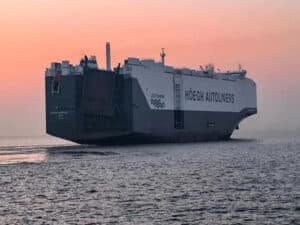
First four-stroke in boxship retrofit to burn LNG
Written by Nick Blenkey
Contract for the conversion was signed at the Europort event this week. Pictured here are (front, left to right) Dr Thomas Spindler (Head of Upgrades & Retrofits, MAN PrimeServ Four-Stroke) and Christian Hoepfner (Wessels Reederei GM); (back, left to right) Marcel Lodder (Project Engineer, Upgrade & Retrofit, MAN PrimeServ), Stefan Eefting (Vice President, MAN PrimeServ), Rainer Runde (Project Manager, Wessels Reederei), and Gerd Wessels (Managing Partner – Wessels Reederei)
NOVEMBER 6, 2015 — German feeder containership operator Wessels Reederei and MAN Diesel & Turbo have now signed a contract covering the retrofit of the four-stroke 8L48/60B main engine in the 1,000 TEU Wes Amelie to dual-fuel operation.
The vessel will be the first of its kind worldwide to be converted to an LNG-capable propulsion system.
By running on LNG, the Wes Amelie will reduce emissions of sulfur oxide by over 99%, nitrogen oxide by approximately 90%, and carbon dioxide by up to 20%.
As we reported last month (see earlier story), Germany’s Federal Ministry of Transport and Digital Infrastructure (BMVI) is providing Wessels Reederei with funding for the conversion through the federal program Mobility and Fuel Strategy, which promotes the maritime use of LNG as an environmentally friendly fuel.
Among the motives for the federal funding is that the Wes Amalie has 23 sister ships, 16 of them structurally identical, which would allow follow-up projects to be easily implemented. The ship therefore facilitates a multiplier effect, with multiple, other “conversion-capable” vessels also found around the European continent. Each ship converted will increase the demand for LNG as fuel, providing an increased market incentive for development of the needed LNG supply infrastructure.
According to Wessels Reederei, essentially all components of the engine combustion chamber and their attachments are to be replaced: cylinder liner, including water cooling jacket, pistons, piston rings and cylinder head. This is due to an increase in cylinder bore from 48 cm to 51 cm.
Additionally, injection components will be replaced or added. The pilot oil system necessary for gas operation will be completely rebuilt.
New valve cams and a new turbocharger rotor assembly will be supplied to allow for the changed ignition timing with what will be a 51/60DF engine.
As control of the multi-fuel engine is more complex than running the original engine on heavy fuel oil a conversion of the engine sensors and new instrumentation is necessary.
Approximately 30 tons of material in total are required for the conversion of the engine.
MAN will also deliver the gas control and pilot oil modules that are necessary for gas operation.
The ship’s classification society, Bureau Veritas (BV), will oversee the coversion iand is responsible for the final inspection, certification and technical approval.
SMB Naval Architects & Consultants will provide the necessary calculations and blueprints for the conversion and installation.
TGE Marine Gas Engineering will provide the fuel tank and required LNG peripherals between the tank and the main engine.
The shipyard where the conversion will be carried has yet to be selected.
Dr. Thomas Spindler, Head of Upgrades & Retrofits – MAN PrimeServ Four-Stroke – MAN Diesel & Turbo, said: “We are very excited about the signing of this contract and view its potential for broader adoption within the maritime sector as significant. We enjoy an excellent cooperation with Wessels and commend their willingness to adopt our dual-fuel technology.”





Leave a Reply
You must be logged in to post a comment.